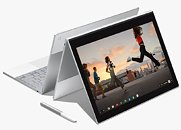- Joined
- Oct 9, 2007
- Messages
- 47,795 (7.40/day)
- Location
- Dublin, Ireland
| System Name | RBMK-1000 |
|---|---|
| Processor | AMD Ryzen 7 5700G |
| Motherboard | Gigabyte B550 AORUS Elite V2 |
| Cooling | DeepCool Gammax L240 V2 |
| Memory | 2x 16GB DDR4-3200 |
| Video Card(s) | Galax RTX 4070 Ti EX |
| Storage | Samsung 990 1TB |
| Display(s) | BenQ 1440p 60 Hz 27-inch |
| Case | Corsair Carbide 100R |
| Audio Device(s) | ASUS SupremeFX S1220A |
| Power Supply | Cooler Master MWE Gold 650W |
| Mouse | ASUS ROG Strix Impact |
| Keyboard | Gamdias Hermes E2 |
| Software | Windows 11 Pro |
Microsoft released one of its key software products, Microsoft Office, to all Chromebooks. Office for Android is now available on all Google Play-enabled Chromebooks. Chrome OS is derived from Android, which itself is a Linux-based operating system. Like the rest of the Android software ecosystem, Office for Android eludes other desktop Linux distributions, due to lack of the required APIs and other quasi-proprietary dependencies exclusively found on Android and Chrome OS.
Microsoft Office is one of the "killer apps" that keep Windows popular. It's been available on the Apple Mac platform for over a decade, and made its long march to the Android platform with the decline of Microsoft's Windows Mobile platform. It should finally make premium chromebooks, such as the Google Pixelbook (pictured below), worth the buy to business professionals on the move.

View at TechPowerUp Main Site
Microsoft Office is one of the "killer apps" that keep Windows popular. It's been available on the Apple Mac platform for over a decade, and made its long march to the Android platform with the decline of Microsoft's Windows Mobile platform. It should finally make premium chromebooks, such as the Google Pixelbook (pictured below), worth the buy to business professionals on the move.

View at TechPowerUp Main Site
Last edited:




 They were like the defacto suppliers for IBM and Apple and others for different apps (along with DOS), until Gates saw his opening and took them all on with Windows.
They were like the defacto suppliers for IBM and Apple and others for different apps (along with DOS), until Gates saw his opening and took them all on with Windows.